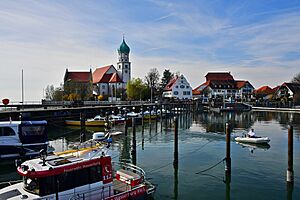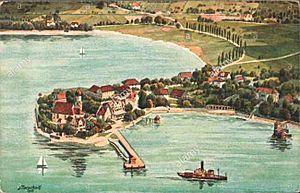Wasserburg am Bodensee facts for kids
Quick facts for kids
Wasserburg am Bodensee
|
||
|---|---|---|

Harbour with the Church of Saint George
|
||
|
||
| Country | Germany | |
| State | Bavaria | |
| Admin. region | Schwaben | |
| District | Lindau | |
| Elevation | 399-450 m (−1,077.4 ft) | |
| Population
(2022-12-31)
|
||
| • Total | 3,954 | |
| Time zone | CET/CEST (UTC+1/+2) | |
| Postal codes |
88142
|
|
| Dialling codes | 0 83 82 | |
| Vehicle registration | LI | |
| Website | www.wasserburg-bodensee.de | |
Wasserburg am Bodensee is a charming town in Bavaria, Germany. It's one of only three Bavarian towns right on the beautiful Lake Constance. Many people visit Wasserburg because its air is thought to be very healthy! It's a popular place for holidays and relaxation.
Contents
Where is Wasserburg?
Wasserburg is located in the Lindau district of Bavaria. It sits right on the northeastern shore of Lake Constance. The town is made up of several smaller areas. These include the main part called Wasserburg, which has the church and castle. Other areas are Mooslachen, Mitten, Reutenen, Hengnau, and Hattnau.
A Look at History
The name "Wasserburg" means "castle in the water." This is because when it was founded in the year 784, it was actually on an island! It was first owned by a famous monastery called St Gallen.
Later, in 1384, the powerful Counts of Montfort took control. They sold the town to the wealthy Fugger family in 1592. A big change happened in 1720. The island was connected to the mainland by a causeway. Some of the old stone columns from this causeway can still be seen today.
In 1755, the Fuggers gave Wasserburg to the Habsburgs to pay off some debts. This meant the town became part of Austria for a while. But in 1806, Napoleon Bonaparte changed things again. He gave Wasserburg to the kingdom of Bavaria.
Modern improvements came to Wasserburg in the late 1800s and early 1900s. A pier for steamships was built in 1872. The first railway station opened in 1899. Then, in 1911 and 1912, electric lights were installed in the town.
What to See in Wasserburg
Wasserburg is famous for its beautiful peninsula. This is where many of its most interesting sights are located.
Main Attractions on the Peninsula
- Church of St George: This church was built in the 14th century and is a key landmark.
- Wasserburg Castle: The historic castle offers amazing views.
- Malhaus: This old building used to be the law courts. Now, it's a museum where you can learn about the town's past.
- The Quay: This is where passenger ferries depart. You can take a boat trip to other towns like Lindau, Bregenz, Konstanz, and Rorschach.
- Harbours: There's a busy fishing harbour and a marina for boats.
From the castle, you can see incredible views. You can look out towards the mountains of Switzerland, Liechtenstein, and Austria.
Antoniuskapelle
The Antoniuskapelle is a small chapel in the Selmnau area. It was first blessed in 1492. Inside, you can see a beautiful Gothic Madonna statue. There are also several baroque sculptures. The chapel is on a hill formed by a glacier. From here, you get a wide view over Lake Constance.
Wasserburg in Books
The famous German writer Martin Walser wrote a novel called A Gushing Fountain. This book is about a boy growing up during the time of Hitler. The story is set right here in Wasserburg am Bodensee.
Economy and Tourism
Today, Wasserburg's economy mostly relies on tourism and growing fruit. Many people come here for holidays. The town has two swimming pools by the beach. You can also rent boats or learn to sail at a local school.
There are many hotels, guesthouses, and bed and breakfast places. They offer over 1,700 beds for visitors! The local fishing industry is also important. Fishermen catch fresh fish from Lake Constance, especially whitefish. These fish are then served in the town's restaurants.
See also
 In Spanish: Wasserburg (Bodensee) para niños
In Spanish: Wasserburg (Bodensee) para niños
 | Victor J. Glover |
 | Yvonne Cagle |
 | Jeanette Epps |
 | Bernard A. Harris Jr. |



